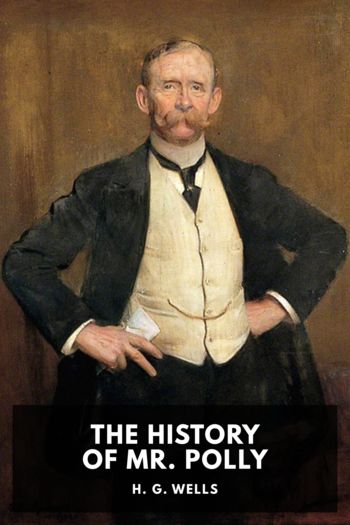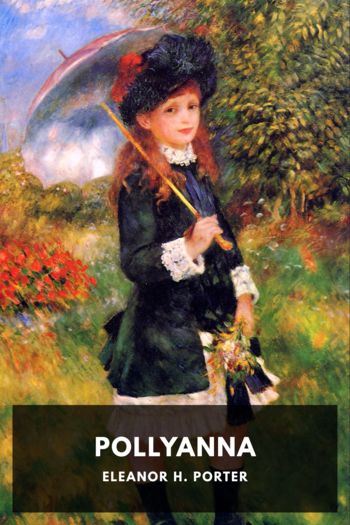Pollyanna Grows Up by Eleanor H. Porter (best ereader for epub txt) 📕

- Author: Eleanor H. Porter
Book online «Pollyanna Grows Up by Eleanor H. Porter (best ereader for epub txt) 📕». Author Eleanor H. Porter
“The North End—that child—alone! Pollyanna!” shuddered Mrs. Carew.
“Oh, I wasn’t alone, Mrs. Carew,” fended Pollyanna. “There were ever and ever so many people there, weren’t there, boy?”
But the boy, with an impish grin, was disappearing through the door.
Pollyanna learned many things during the next half-hour. She learned that nice little girls do not take long walks alone in unfamiliar cities, nor sit on park benches and talk to strangers. She learned, also, that it was only by a “perfectly marvelous miracle” that she had reached home at all that night, and that she had escaped many, many very disagreeable consequences of her foolishness. She learned that Boston was not Beldingsville, and that she must not think it was.
“But, Mrs. Carew,” she finally argued despairingly, “I am here, and I didn’t get lost for keeps. Seems as if I ought to be glad for that instead of thinking all the time of the sorry things that might have happened.”
“Yes, yes, child, I suppose so, I suppose so,” sighed Mrs. Carew; “but you have given me such a fright, and I want you to be sure, sure, sure never to do it again. Now come, dear, you must be hungry.”
It was just as she was dropping off to sleep that night that Pollyanna murmured drowsily to herself:
“The thing I’m the very sorriest for of anything is that I didn’t ask that boy his name nor where he lived. Now I can’t ever say thank you to him!”
VII A New AcquaintancePollyanna’s movements were most carefully watched over after her adventurous walk; and, except to go to school, she was not allowed out of the house unless Mary or Mrs. Carew herself accompanied her. This, to Pollyanna, however, was no cross, for she loved both Mrs. Carew and Mary, and delighted to be with them. They were, too, for a while, very generous with their time. Even Mrs. Carew, in her terror of what might have happened, and her relief that it had not happened, exerted herself to entertain the child.
Thus it came about that, with Mrs. Carew, Pollyanna attended concerts and matinees, and visited the Public Library and the Art Museum; and with Mary she took the wonderful “seeing Boston” trips, and visited the State House and the Old South Church.
Greatly as Pollyanna enjoyed the automobile, she enjoyed the trolley cars more, as Mrs. Carew, much to her surprise, found out one day.
“Do we go in the trolley car?” Pollyanna asked eagerly.
“No. Perkins will take us,” answered Mrs. Carew. Then, at the unmistakable disappointment in Pollyanna’s face, she added in surprise: “Why, I thought you liked the auto, child!”
“Oh, I do,” acceded Pollyanna, hurriedly; “and I wouldn’t say anything, anyway, because of course I know it’s cheaper than the trolley car, and—”
“ ‘Cheaper than the trolley car’!” exclaimed Mrs. Carew, amazed into an interruption.
“Why, yes,” explained Pollyanna, with widening eyes; “the trolley car costs five cents a person, you know, and the auto doesn’t cost anything, ’cause it’s yours. And of course I love the auto, anyway,” she hurried on, before Mrs. Carew could speak. “It’s only that there are so many more people in the trolley car, and it’s such fun to watch them! Don’t you think so?”
“Well, no, Pollyanna, I can’t say that I do,” responded Mrs. Carew, dryly, as she turned away.
As it chanced, not two days later, Mrs. Carew heard something more of Pollyanna and trolley cars—this time from Mary.
“I mean, it’s queer, ma’am,” explained Mary earnestly, in answer to a question her mistress had asked, “it’s queer how Miss Pollyanna just gets ’round everybody—and without half trying. It isn’t that she does anything. She doesn’t. She just—just looks glad, I guess, that’s all. But I’ve seen her get into a trolley car that was full of cross-looking men and women, and whimpering children, and in five minutes you wouldn’t know the place. The men and women have stopped scowling, and the children have forgot what they’re cryin’ for.
“Sometimes it’s just somethin’ that Miss Pollyanna has said to me, and they’ve heard it. Sometimes it’s just the ‘Thank you,’ she gives when somebody insists on givin’ us their seat—and they’re always doin’ that—givin’ us seats, I mean. And sometimes it’s the way she smiles at a baby or a dog. All dogs everywhere wag their tails at her, anyway, and all babies, big and little, smile and reach out to her. If we get held up it’s a joke, and if we take the wrong car, it’s the funniest thing that ever happened. And that’s the way ’tis about everythin’. One just can’t stay grumpy, with Miss Pollyanna, even if you’re only one of a trolley car full of folks that don’t know her.”
“Hm-m; very likely,” murmured Mrs. Carew, turning away.
October proved to be, that year, a particularly warm, delightful month, and as the golden days came and went, it was soon very evident that to keep up with Pollyanna’s eager little feet was a task which would consume altogether too much of somebody’s time and patience; and, while Mrs. Carew had the one, she had not the other, neither had she the willingness to allow Mary to spend quite so much of her time (whatever her patience might be) in dancing attendance to Pollyanna’s whims and fancies.
To keep the child indoors all through those glorious October afternoons was, of course, out of the question. Thus it came about that, before long, Pollyanna found herself once more in the “lovely big yard”—the Boston Public Garden—and alone. Apparently she was as free as before, but in reality she was surrounded by a high stone wall of regulations.
She must not talk to strange men or women; she must not play with strange children; and under no circumstances must she step foot outside the Garden except to come home. Furthermore, Mary, who had taken her to the Garden and left her,





Comments (0)